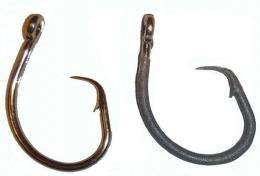New fishing hook reduces shark catch

(PhysOrg.com) -- Scientists have developed a new type of fishing hook to reduce the number of sharks accidently caught from commercial fishing. The special hook, called SMART Hook (Selective Magnetic and Repellent-Treated Hook), combines two shark repellent technologies--magnetism and shark repellent metals--into standard fishing hooks.
The final product is a fishing hook that interferes with the highly sensitive electrical sense found in a shark's nose. Market-valuable fish, such as tuna, do not have this electrical sense and are not repelled by the hook.
In 2010, with the support of a National Science Foundation (NSF) Small Business Innovation Research (SBIR) grant, Shark Defense researcher Patrick Rice and student researchers at the Florida Keys Community College conducted feeding trials with bonnethead sharks to test SMART Hooks. The sharks were simultaneously given bait attached to regular hooks and bait attached to SMART Hooks. The barbs on the hooks were removed so that the sharks were not injured. The researchers recorded the number of baits that the sharks took off each type of hook.

Following a total of 50 tests with two different groups of sharks, researchers found a 66 percent reduction of baits eaten from small, recreational-sized hooks and a 94 percent reduction of baits eaten from larger, commercial-sized hooks. The larger hooks were able to incorporate more magnetism and shark repellent metals.
Overall, the magnetic and shark-repellent metal technologies used in the SMART Hook have previously shown an 18 percent to 68 percent reduction in shark catch, depending on the location and the species.
"Combining a magnetic repellent with a galvanic repellent is very important, because many studies have shown that sharks behave differently to magnets or metals alone," said Craig O'Connell, who researches the effects of magnetism in sharks with Shark Defense and publishes on the subject. "There are many species of shark, and they seek out their prey differently. Having two repellents available increases the chances that the sharks will be deterred."
Provided by National Science Foundation















